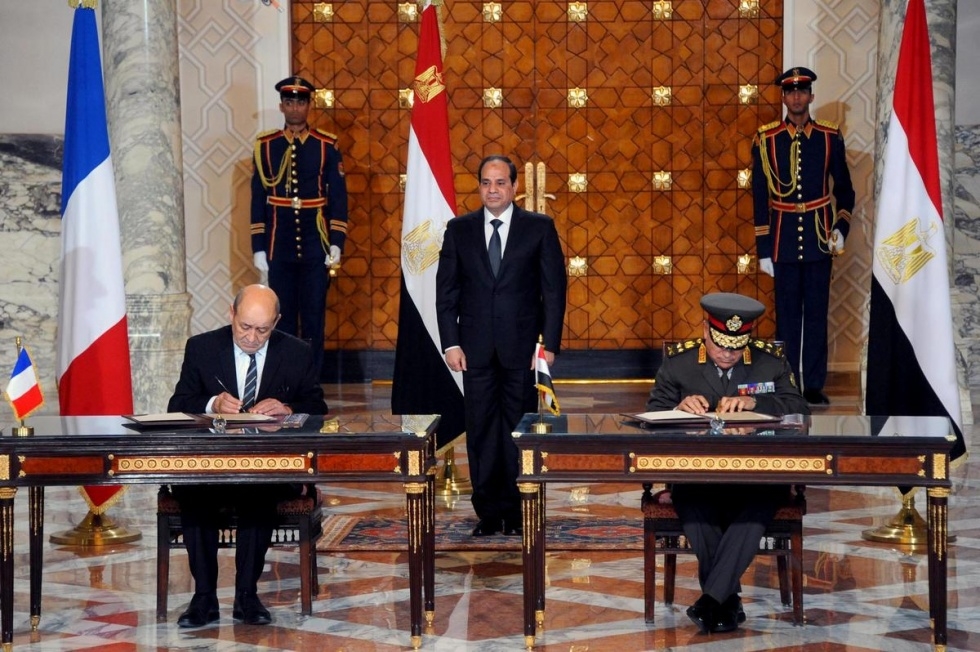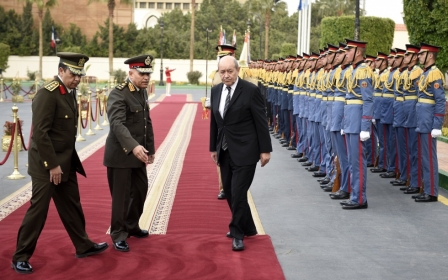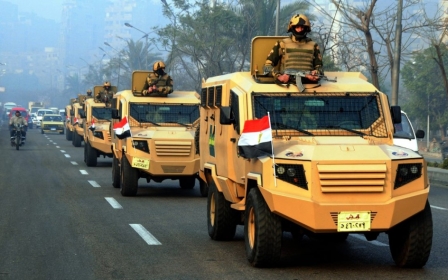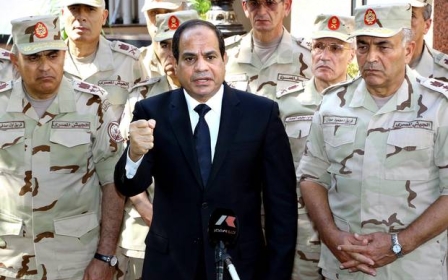Egypt's Sisi becomes 'key anti-IS ally' after Libya raids

By targeting the Islamic State group with airstrikes in Libya, Egypt's President Abdel Fattah al-Sisi has become a key ally of the West against the militants, experts say.
His warplanes bombed IS camps and weapons stores in the Libyan city of Derna hours after the militants released a gruesome video showing masked fighters beheading 21 Egyptian Christians on a Libyan beach.
The raids were the first time Egypt has announced military action against targets in its western neighbour, having previously denied it targeted militants there.
"The air strikes in Libya are an important new factor," said Zack Gold of the Tel Aviv-based Institute for National Security Studies.
"Egypt and President Sisi have emerged as a key ally of the West in the fight against IS.
Egypt had steered clear of a direct fight with IS outside of the country, although US officials say Cairo previously allowed the United Arab Emirates to use its air bases to bomb targets in Libya.
Sisi has regularly said Cairo is fighting its own "war on terrorism" in the restive Sinai Peninsula, where an insurgency has killed scores of policemen and soldiers.
Officials blame the blacklisted Muslim Brotherhood of former president Mohamed Morsi, who was ousted by then army chief Sisi in July 2013, for deadly attacks in the country, a charge the movement denies and brands as baseless and politically motivated, insisting that they have not changed their course of peaceful protests.
The attacks have been claimed by militants groups such as IS-linked Ansar Beit al-Maqdis.
In a statement, the pro-Morsi National Alliance for the Defense of Legitimacy condemned "the killing of Egyptians in Libya and warn[ed] from implicating Egypt in adventures abroad."
The bloc also accused the Egyptian government of being complicit in the killing of Egyptians for "failing to save them despite the crisis extending for several days."
US 'more willing to accept Egypt's position'
The Brotherhood has been a target of a brutal crackdown overseen by Sisi since Morsi's overthrow.
More than 1,400 people, mostly Morsi supporters, have been killed, thousands imprisoned and hundreds sentenced to death after speedy trials which the United Nations says are "unprecedented in recent history".
Global rights groups have condemned the crackdown against the Brotherhood, which made strong electoral gains after the 2011 revolution that ousted longtime autocrat Hosni Mubarak.
"The creation of the Islamic State... has helped the Egyptian narrative that this was not just a threat to Iraq and Syria, but this was a threat from violent extremism to the Sinai, to Yemen," said Gold.
"The United States is now more willing to accept Egypt's position that its own transition is going to be a slow one and that its own internal issue is not open to international debate."
Weeks after police raided two pro-Morsi protest camps in Cairo on August 14, 2013 at the cost of hundreds of lives, Washington suspended its annual $1.5 billion military aid to Cairo, citing human rights concerns.
It warmed up to Cairo only in recent months by unfreezing the aid, and it offered Apache helicopters to the Egyptian army to fight militants in Sinai.
Human rights 'to take a back seat'
Bombing IS targets in Libya will now show Sisi's resolve to counter a wider militant threat in the region, said HA Hellyer, Arab affairs expert at Washington-based Brookings Institute.
"In this case, he probably sees the Egyptian action as comparable to the Jordanian military retaliation after the killing of their pilot," said Hellyer.
Jordan, a member of US-led coalition fighting IS in Iraq and Syria, where the group has captured swathes of territory, escalated its air campaign after the militants claimed the killing of a Jordanian pilot captured in Syria in December.
"With strikes in Libya, Sisi's stature will definitely rise in the West and also at home," said Mustapha Kamel al-Sayyid, a Cairo University political professor.
"Although he has been building new allies by speaking to Russia, China and France, the Libyan operation will also help lift the rest of US sanctions imposed on Egypt when the military aid was frozen."
On Monday, Egypt signed a 5.2 billion euro ($5.9 billion) deal to purchase 24 French Rafale warplanes - a show of support for Sisi who wants to break a US monopoly over Egypt's arms supplies.
Hellyer said air raids in Libya would silence some critics of Sisi's government.
"There remain those critical of Egypt due to human rights concerns and curbing of civil liberties, but against the backdrop of Daesh or ISIS, that's likely to take a back seat," he said referring to IS with its other names.
Egypt's army on Monday deployed forces across the country, shortly after launching strikes against IS in Libya.
Army spokesman Mohamed Samir said in a statement that the deployments were in line with decisions taken by the country's National Defense Council to protect vital institutions.
Sisi seeks international anti-IS coalition that includes Russia
The UN Security Council (UNSC) will convene on Wednesday to discuss fighting "terrorism" in Libya, the Egyptian Foreign Ministry has said.
Sisi on Tuesday urged the UNSC to adopt a resolution allowing for an international military intervention in Libya.
"There is no other choice. Taking into account that the Libyan people must agree that we act to restore security and stability," Sisi said in an interview with French radio Europe 1.
Egypt seeks to form an international coalition to participate in strikes against IS in Libya, an Egyptian diplomat has said.
"Egypt continues to hold talks to form a coalition to stage strikes against ISIL," the diplomat, requesting anonymity, told the Anadolu Agency.
The diplomat said that the potential coalition would likely include France, Italy, Saudi Arabia, Kuwait and the United Arab Emirates (UAE).
The diplomat, meanwhile, said Egypt also held talks with Russia with the aim of getting Russian support for Egyptian military operations in Libya.
"The Russian side welcomed the Egyptian reaction," the diplomat said, adding that the Russians had described Egypt's reactions to the recent beheading of 21 of its citizens in Libya as "bold."
According to the diplomat, Russia was ready to offer all types of support for Egypt.
Meanwhile, a high-level Libyan delegation arrived in Cairo on Monday, headed by Deputy Prime Minister Abdel-Salam Mohamed Ali al-Badri.
Oil prices rose around five percent late Monday after Egypt's airstrikes on Libya. Libya's oil output has significantly fallen since former leader Muammar Gaddafi was ousted in 2011, decreasing below 500,000 barrels per day in 2014 from 1.6 million barrels per day in 2010, according to the US Energy Information Administration.
New MEE newsletter: Jerusalem Dispatch
Sign up to get the latest insights and analysis on Israel-Palestine, alongside Turkey Unpacked and other MEE newsletters
Middle East Eye delivers independent and unrivalled coverage and analysis of the Middle East, North Africa and beyond. To learn more about republishing this content and the associated fees, please fill out this form. More about MEE can be found here.




